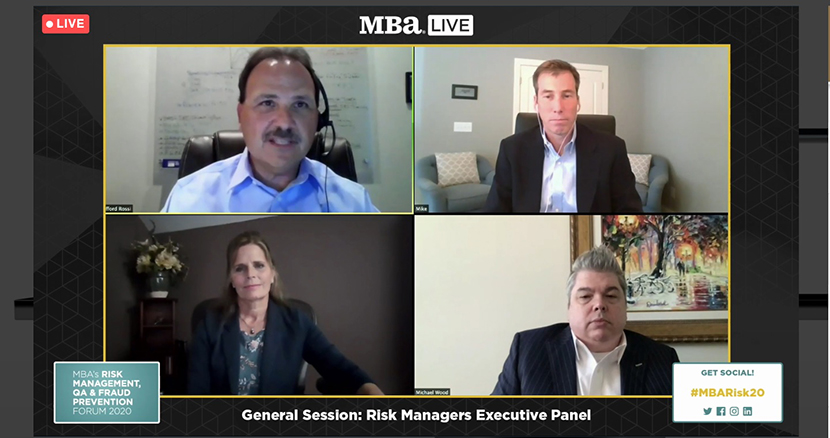
Leading During Turbulent Times (MBA LIVE)

Clockwise from top left: Clifford Rossi, Michael Derstine, Michael Wood, Suzanne Shuck
Risk managers face many challenges during this turbulent time, but the mortgage industry has largely been successful in weathering this pandemic, panelists said Wednesday at the MBA Live Risk Management, QA and Fraud Prevention Forum.
“This pandemic was a curve ball none of us could anticipate,” said Michael Wood, Credit Risk Executive in Client Underwriting and Data Analytics with Bank of America, Charlotte, N.C. “I think the industry’s done a really good job globally. The fact that we all have invested so much in technology in recent years probably made this event a little bit easier for us to maneuver in and out of things.”
Wood noted the speed of change presented a challenge. “There was not much time to prepare for the speed of announcements coming from the government and the regulators, but I think the industry did a really nice job in banding together and being transparent and sharing information,” he said. “All these things factored in made this a little easier to manage through. So it was not as disruptive as it could have been and we’re all thankful for that.”
Michael Derstine, Senior Vice President and Chief Risk Officer with Genworth Mortgage Insurance, Raleigh, N.C., said the pandemic was unlike other events risk managers had modeled in the past. “It was not like Hurricanes Harvey or Katrina, which were the only models for sudden dislocation,” he said. “You had to try to take the quantitative and mental models about how crises develop and extrapolate from that.”
Derstine said one way Genworth mitigated the risk was by being very transparent in developing scenarios and very wide-ranging in its assumption sets. “And we made sure we stress-tested them with enough rigor,” he said.
Suzanne Shuck, Chief Risk Officer with Freedom Mortgage Corp., Mount Laurel, N.J., said the mortgage industry presented a “united front” in demanding clarity from the government and regulators during a time when there were no clear guidelines. “I think the voices of the MBA and other groups like the American Bankers Association and all the lenders and servicers together helped us because when there is not that explicit, clear guidance, that’s when there could be trouble. And that can impact reputational risk.”
Wood agreed, saying the more the mortgage industry can demonstrate transparency and clear, concise communication both internally and externally, the better it will be able to serve all its customers. “Because at the end of the day, we are all in this together, and we want the mortgage industry to survive and thrive and one of the ways we do that is to learn lessons through instances like this, to be better in the future and to be more involved in comment periods, in providing feedback [to the government and regulators] when they ask for it,” he said.
“It’s easy to get busy with day-to-day tasks and set those kind of things aside, but I think this has taught all of us that we should take advantage of the situations–if we are being asked to participate and give our opinions, we should always step up to the plate and give them because that will make us better and stronger for the future,” Wood said.
